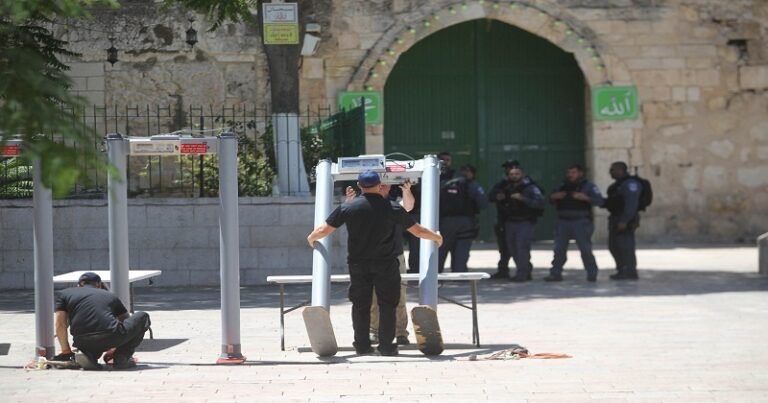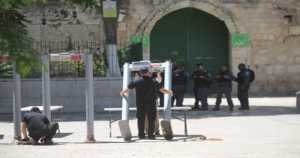

JERUSALEM (Ma’an) — Civil disobedience demonstrations in front of the Al-Aqsa Mosque compound were again violently attacked by Israeli forces Saturday night, exactly a week after Palestinians started praying outside of the compound’s gates in protest of new Israeli security measures installed at the holy site.
On Sunday morning, Palestinians reiterated their rejection to all forms of security inspection as an obstacle to their ability to worship freely, including a reported proposal to replace the new metal detectors, which worshipers have been boycotting, with “smart cameras.”
After clashes broke out following the midday, afternoon, and evening prayers on Saturday, dozens more were injured at the Lions’ Gate, entrance to the compound coinciding with the Ishaa, night time prayer, as confrontations with Israeli forces were reported across occupied East Jerusalem and the West Bank.
A 23-year-old Palestinian was shot dead during clashes overnight in the town al-Eizariya in the Jerusalem district of the West Bank.

Meanwhile, Israeli police fired sound bombs and rubber-coated bullets directly at Palestinian worshipers in Jerusalem’s Old City, chased them on horseback, beat them with batons, and attempted to block off and close the area completely for the Ishaa prayer.
Worshipers continued to try to get as close as possible to the Lions’ Gate and prayed in the surrounding streets instead, while Jerusalemite residents of the Old City were able to pray within the city walls nearer to the mosque.
After the prayer ended, Israeli forces fired sound bombs at worshipers again in different areas in occupied East Jerusalem, triggering clashes in Wadi al-Joz, Issawiya, and al-Tur, where Palestinian youth responded to by throwing rocks and Molotov cocktails at Israeli forces.
By the end of the night, the Palestinian Red Crescent said that its medical crews provided treatment to some 63 Palestinians in Jerusalem, 14 of whom required further treatment and were transferred to hospitals. The remainder were treated at the scene of clashes for injuries sustained from tear gas, sound bombs, and rubber-coated steel bullets.
Israeli police spokesperson Luba al-Samri wrote in a statement Sunday morning that Israeli forces dispersed Palestinians who were throwing rocks and Molotov cocktails at Israeli forces overnight in the occupied East Jerusalem’s Silwan and Ras al-Amud neighborhoods.
Silwan is the hometown of Muhammad Sharaf, who was shot and killed by an Israeli settler in Ras al-Amud during major clashes in across Jerusalem and the West Bank that left two other young Palestinian men killed and hundreds of others injured on Friday.
Al-Samri said Israeli police dispersed the rock throwers “without causing injuries or damages.”

Palestinians firm in their rejection of new security measures
Meanwhile, Sheikh Muhammad Hussien, the Grand Mufti of Jerusalem, reiterated his rejection to all new Israeli security measures at Al-Aqsa Mosque, stressing that the situation must return to the way it was before July 14.
Three Palestinians assailants and two Israeli policemen were killed in a shoot-out that day inside the compound, which triggered the new Israeli security measures, which included metal detectors, additional surveillance cameras, and turnstiles.
Palestinians have seen the new security measures at Al-Aqsa as just the latest example of Israeli authorities using Israeli-Palestinian violence and tensions as a means of furthering control over important sites in the occupied Palestinian territory and normalizing heightened measures by Israeli forces targeting Palestinians.
Israeli news site Ynet reported that Israeli police set up new, “special” surveillance cameras at one of the entrances to the compound Sunday morning, reportedly to replace the metal detectors. “The cameras can identify anyone who tries to enter the holy site with knives, weapons, hand grenades or other suspicious items,” Ynet said.
However, Hussien told Ma’an that Palestinians rejected the metal detectors and “all other measures” that obstruct the entry of worshipers to Al-Aqsa Mosque.

Palestinian Minister of Islamic Affairs Mahmoud al-Habash called upon United Nations Security Council to make an urgent intervention to stop the Israeli escalation against the Palestinian people and their holy sites, “before it’s too late.”
The UNSC is reportedly set to hold an emergency meeting on Monday to discuss the crisis. Sweden, Egypt, and France requested the meeting to “urgently discuss how calls for de-escalation in Jerusalem can be supported,” Sweden’s Deputy UN ambassador, Carl Skau, posted on Twitter.
Al-Habash said in statement that the metal detectors were the main reason behind the popular uprising and that there was “no alternative but to remove them,” and said that the Palestinian people and their leaderships were unified in their rejection of the metal detectors.
Fatah spokesperson Osama al-Qawasmi also released a statement affirming the movement’s determined stance against metal detectors and all other alternative security measures at the mosque.
Al-Qawasmi said that the stance of Palestinian President Mahmoud Abbas was “very clear and and not open to negotiation or compromise.”
The Fatah spokesperson said that Israeli was “fully aware” that the aim of metal detectors and cameras had nothing to do with security and were instead seeking to impose further Israeli control on the the compound, as well as the Old City and Jerusalem at large.
Late Saturday, Israeli Prime Minister Benjamin Netanyahu, Public Security Minister Gilad Erdan, and Police Commissioner Roni Alsheikh reportedly discussed the security situation around the mosque, and the Israeli Security Cabinet is expected to meet Sunday evening to discuss the matter as well.

Israel’s intelligence service, the Shin Bet, and the Coordinator of Government Activities in the Territories (COGAT) have both expressed reservations to Netanyahu about the use of metal detectors at Al-Aqsa, arguing that the anger sparked by the measures might outweigh the security benefits of keeping them.
US President Donald Trump’s envoy to the Middle East Jason Greenblatt, special adviser Jared Kushner, and US Ambassador to Israel David Friedman are also reportedly working “behind-the-scenes” with Netanyahu to resolve the crisis.
Palestinian President Mahmoud Abbas, who claimed he had severed all ties with Israel in response to the crisis, is also reportedly involved in talk with the Jordanians, who have custodianship over the holy site.